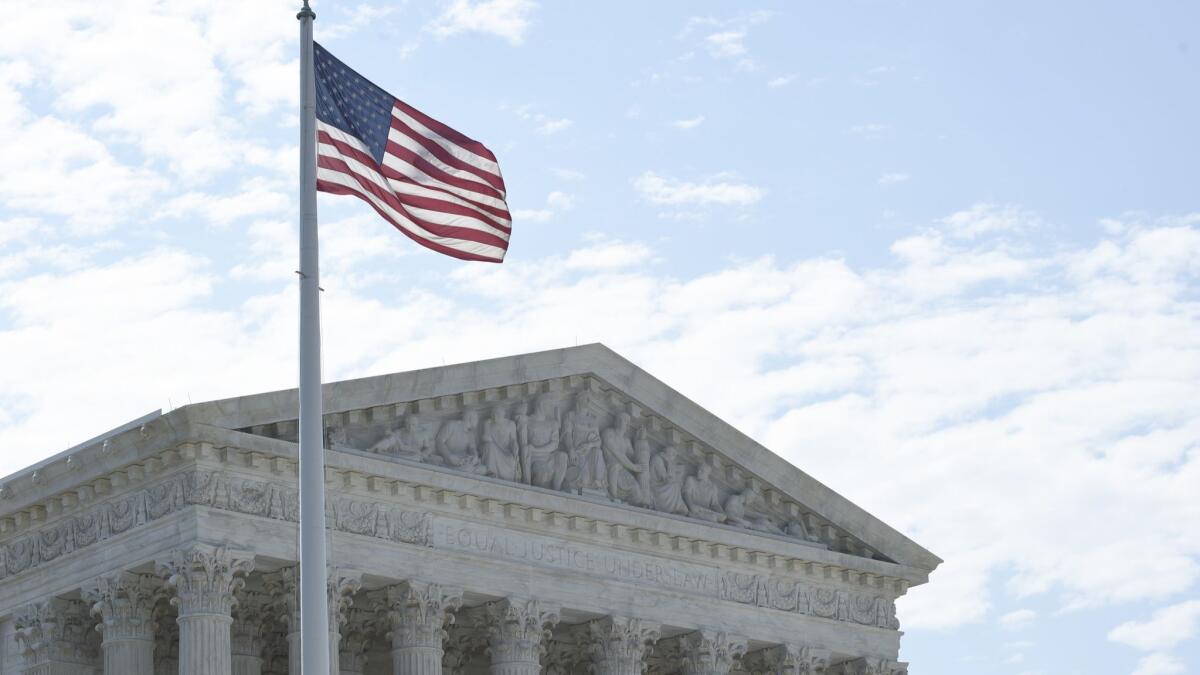Editorial: The Supreme Court continues to grant an unhealthy immunity to police accused of wrongdoing

The Supreme Court this week ruled that a Tucson police officer who shot and wounded a woman in her front yard couldn’t be sued for damages. It was the latest, but almost certainly not the last, decision by the court to give the benefit of the doubt to law enforcement officials accused of abusing their authority. It’s time for the court to reconsider this and other legal doctrines that make it hard for victims of official misconduct to have their day in court. And if it doesn’t, Congress should act.
Without even hearing oral arguments, the justices ruled against Amy Hughes, who was shot four times by Cpl. Andrew Kisela. Yet as Justice Sonia Sotomayor argued in a powerful dissent joined by Justice Ruth Bader Ginsburg, a jury might well have concluded that officer Kisela violated Hughes’ 4th Amendment rights by “needlessly resorting to lethal force.”
Yes, Hughes refused to drop a kitchen knife she was holding, and, yes, police had been told that she was behaving erratically. But Sotomayor pointed to other details that called the officer’s judgment into question.
The Supreme Court needs to stop placing its institutional thumb on the scale when those in authority are accused of violating the Constitution.
“Hughes was nowhere near the officers, had committed no illegal act, was suspected of no crime, and did not raise the knife in the direction of [her roommate] or anyone else,” Sotomayor wrote. “Faced with these facts, the two other responding officers held their fire, and one testified that he ‘wanted to continue trying verbal command[s] and see if that would work.’ ”
Nevertheless, a majority of the court ruled that Kisela was protected against being personally sued because of a doctrine known as “qualified immunity.” This doctrine, which the court announced in a 1982 case involving a lawsuit against two Nixon administration aides, requires that in order for a government official to be successfully sued, he or she must violate not only the Constitution but “clearly established statutory or constitutional rights of which a reasonable person would have known.”
The problem is that, as in this case, the court can interpret that in a way that makes it unreasonably hard for victims of official misconduct to collect damages.
Last year the court ruled that a group of public officials including former Atty. Gen. John Ashcroft and former FBI Director Robert S. Mueller III couldn’t be sued for allegedly conspiring to violate the rights of undocumented men of Arab or South Asian descent who were detained and mistreated after 9/11.
A federal law allows suits against two or more persons who “conspire” to deprive any person of equal protection of the laws. But the court ruled that at the time in question it was an “open” legal question whether a policy discussion among officials in the same government department could amount to conspiracy. Therefore the officials were entitled to immunity.
Whether it is interpreted broadly or narrowly, the doctrine of qualified immunity is not required either by the Constitution or by federal laws that authorize lawsuits against individuals who violate civil rights. Rather, the court has justified it on historical and pragmatic grounds. One critic of the doctrine, University of Chicago law professor William Baude, recently wrote that what he called the court’s “crusade” to enforce qualified immunity “does not serve congressional intent or the rule of law.”
Qualified immunity isn’t the only legal concept the court has wielded to make it harder to sue police and public officials. In a 1989 ruling in Graham vs. Connor, a case in which qualified immunity wasn’t an issue, the court said that the reasonableness of a police officer’s use of force must be judged in light of the fact that “police officers are often forced to make split-second judgments.”
Finally, the court in recent years has gutted a landmark 1971 decision called Bivens vs. Six Unknown Named Agents in which it allowed a damages suit against federal narcotics agents even though Congress hadn’t specifically authorized lawsuits against federal officials acting in their official capacity. Writing for the court last year, Justice Anthony M. Kennedy implied strongly that the court won’t entertain additional such suits unless Congress passed new legislation.
Congress should make it clear that where there’s a violation of rights by federal officers there is also a remedy. But the Supreme Court also needs to stop placing its institutional thumb on the scale when those in authority are accused of violating the Constitution.
Follow the Opinion section on Twitter @latimesopinionand Facebook
More to Read
A cure for the common opinion
Get thought-provoking perspectives with our weekly newsletter.
You may occasionally receive promotional content from the Los Angeles Times.










